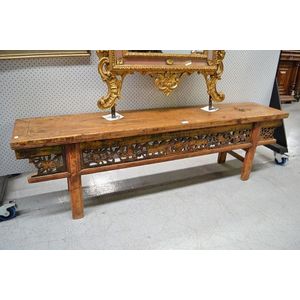Victorian 4-Poster Mahogany Farmhouse Double Bed
Victorian mahogany 4 poster farmhouse double bed with rolling pin ends
You must be a subscriber, and be logged in to view price and dealer details.
Subscribe Now to view actual auction price for this item
When you subscribe, you have the option of setting the currency in which to display prices to $Au, $US, $NZ or Stg.
This item has been sold, and the description, image and price are for reference purposes only.
- Victorian Period - The Victorian period of furniture and decorative arts design covers the reign of Queen Victoria from 1837 to 1901. There was not one dominant style of furniture in the Victorian period. Designers used and modified many historical styles such as Gothic, Tudor, Elizabethan, English Rococo, Neoclassical and others, although use of some styles, such as English Rococo and Gothic tended to dominate the furniture manufacture of the period.
The Victorian period was preceded by the Regency and William IV periods, and followed by the Edwardian period, named for Edward VII (1841 ? 1910) who was King of the United Kingdom and the British Dominions and Emperor of India for the brief period from 1901 until his death in 1910. - Mahogany - Mahogany is a dense, close grained red-coloured timber from the West Indies and Central America. It was first imported into Europe in the the early 18th century and its use continued through the 19th century. It was popular for furniture making because of its strength, the wide boards available, the distinctive grain on some boards, termed flame mahogany and the rich warm colour of the timber when it was polished.. The "flame" was produced where a limb grew out from the trunk of the tree, and this timber was usually sliced into veneers for feature panels on doors, backs and cornices.
Some terms used to describe mahogany relate to the country from which it originally came, such as "Cuban" mahogany, "Honduras" mahogany etc. However unless the wood has been tested the names assigned are more a selling feature, rather than a true indication of the timber's origin. - Rolling Pin - A decorative ornament often found on Australian colonial furniture mainly from the second half of the 19th century. It consists of a turned piece of timber, perhaps 45 cm long, with small turned finials at either end. It is used, for example, to surmount the shaped backs of some miner's couches or four-poster beds.
This item has been included into following indexes:
Visually similar items

A Tasmanian huon pine single bed, 19th century, 120 cm high, 113 cm wide, 202 cm long
Sold by
in
for
You can display prices in $Au, $US, $NZ or Stg.

Pair of Sheffield Plated candelabra
Sold by
in
for
You can display prices in $Au, $US, $NZ or Stg.

William IV mahogany folding card table on pedestal base
Sold by
in
for
You can display prices in $Au, $US, $NZ or Stg.

Old Chinese long low table, approx 54 cm high, 184 cm long
Sold by
in
for
You can display prices in $Au, $US, $NZ or Stg.
